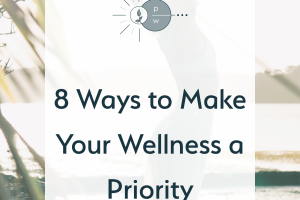Prioritizing Wellness: Tips for Making Healthier Decisions

In today’s fast-paced world, prioritizing wellness has become more important than ever. Many individuals find themselves juggling various responsibilities, often neglecting their health in the process. However, taking the time to focus on one’s well-being can yield profound benefits, both physically and mentally.
- Prioritizing Wellness: Tips for Making Healthier Decisions
- The Challenge of Modern Life
- Understanding the Importance of Prioritizing Wellness
- Physical Health
- Mental Health
- Tips for Making Healthier Decisions
- Establishing a Routine
- Incorporating Exercise Into Your Day
- Creating Healthy Meal Plans
- Prioritizing Sleep
- Managing Stress Levels
- Understanding Stress Triggers
- Practicing Relaxation Techniques
- Engaging in Hobbies
- Building a Support System
- The Power of Connection
- Seeking Professional Support
- Creating Safe Spaces for Sharing
- The Impact of Social Relationships on Health
- Nurturing Positive Relationships
- Setting Boundaries
- Practicing Mindfulness and Self-Care
- The Essence of Mindfulness
- The Importance of Self-Care
- Setting Realistic Goals
- Short-term Goals
- Long-term Goals
- Balancing Work and Personal Life
- The Importance of Boundaries
- Time Management Strategies
- Seeking Professional Help When Needed
- The Benefits of Professional Support
- When to Consider Professional Help
The Challenge of Modern Life
With the constant barrage of emails, meetings, and social media demands, it’s easy to let self-care slip through the cracks. For instance, a busy professional might skip meals or forego exercise in favor of working late, leading to burnout and health issues. To combat this, individuals can:
- Assess their daily routines
- Identify areas for improvement
- Make gradual changes that promote a healthier lifestyle
Understanding the significance of wellness lays the groundwork to begin a transformative journey towards a more balanced and fulfilling life. Embracing this path not only enhances personal health but also positively impacts relationships and overall happiness.
Understanding the Importance of Prioritizing Wellness
Recognizing the importance of prioritizing wellness can significantly enhance one’s quality of life. It’s not just about avoiding illness; it’s about thriving and feeling your best both physically and mentally.
Physical Health
Physical health is often the first thing that comes to mind when considering wellness. Regular exercise, nutritious meals, and ample hydration play pivotal roles in maintaining energy levels and overall vitality. For example, a friend of mine started a morning routine of brisk walking and meal prepping on Sundays. She noticed increased energy throughout the week, which helped her stay more productive at work. Key benefits of prioritizing physical health include:
- Improved immune function
- Enhanced stamina and endurance
- Better weight management
Mental Health
Equally important is mental health, which can often be overlooked. The pressures of daily life can lead to stress, anxiety, and depression. Engaging in activities such as mindfulness, journaling, or connecting with loved ones can foster a positive mindset. One personal story illustrates this: after experiencing a stressful period at work, a colleague took up yoga and meditation, which transformed her approach to life’s challenges. Ways to support mental health:
- Practice self-care regularly
- Seek social support
- Limit screen time before bed
By focusing on both physical and mental wellness, individuals can cultivate a holistic sense of health that leads to a more fulfilling life.
Tips for Making Healthier Decisions
Once the significance of wellness is acknowledged, the next step is to implement strategies that make healthier decisions a part of everyday life. Here are some practical tips to get started.
Establishing a Routine
One of the most effective ways to make healthier choices is by establishing a daily routine. Having consistent times for meals, exercise, and self-care helps the body and mind adjust. For instance, my cousin began waking up at 6 a.m. for a morning walk, which not only set a positive tone for her day but also became a cherished habit.
Incorporating Exercise Into Your Day
Exercise doesn’t have to be a chore. Find activities that you genuinely enjoy, whether it’s dancing, hiking, or playing a sport. Aim for at least 30 minutes of moderate activity a day. Consider:
- Joining a local sports league
- Taking the stairs instead of the elevator
- Scheduling a walk during work breaks
Creating Healthy Meal Plans
Planning meals in advance can drastically improve your nutrition. Create a grocery list based on weekly recipes, focusing on whole foods. A simple template may include:
- Breakfast: Smoothies, oatmeal
- Lunch: Quinoa salads, wraps
- Dinner: Grilled options with veggies
Prioritizing Sleep
Good health is not just about physical activity and eating right; ample sleep is crucial too. Aim for 7-9 hours each night. Develop a calming pre-sleep routine, such as reading or meditating, to help signal your body that it’s time to rest. By incorporating these strategies, individuals can make healthier decisions that contribute to their overall wellness journey.
Managing Stress Levels
Having established strategies for making healthier decisions, managing stress levels becomes a crucial next step in the journey towards overall wellness. Stress can drastically impact both physical and mental health, so learning effective management techniques is essential.
Understanding Stress Triggers
Identifying what causes stress in your life is the first step to managing it. Reflect on your daily routine—are there specific situations or people that elevate your stress? Being aware of these triggers allows you to develop coping strategies. For example, a close friend realized that work-related emails late at night contributed to her anxiety. She decided to stop checking emails after 6 p.m., resulting in a significant drop in her stress levels.
Practicing Relaxation Techniques
Incorporating relaxation techniques can have a profound impact on reducing stress. Activities such as deep breathing, meditation, or yoga promote relaxation and mental clarity. My partner swears by guided meditation apps, which help him unwind after a long day.
Engaging in Hobbies
Making time for hobbies or activities that bring joy can also alleviate stress. Whether it’s painting, knitting, or gardening, immersing oneself in a creative outlet is a great way to escape daily pressures. Ultimately, recognizing stress triggers and actively engaging in stress-reduction practices can empower individuals to regain control over their well-being.
Building a Support System
As we continue the journey towards improved wellness, another vital aspect is building a support system. Surrounding oneself with positive, encouraging individuals can significantly impact mental and emotional well-being.
The Power of Connection
Connecting with others who share similar goals can foster motivation and accountability. Whether it’s friends, family, or colleagues, a reliable support system makes it easier to stay committed to healthier choices. For instance, a friend of mine formed a workout group with three colleagues, and they all encouraged one another to stick to their fitness routines, turning exercise into a fun group activity.
Seeking Professional Support
Sometimes, building a support system might also include seeking professional help. Therapists, nutritionists, or life coaches can provide valuable insights and guidance tailored to individual needs. Don’t hesitate to reach out for help when needed—it’s a sign of strength, not weakness.
Creating Safe Spaces for Sharing
Establishing spaces to share experiences, struggles, and achievements is crucial. Consider:
- Organizing regular catch-up sessions with friends
- Joining local support groups or online forums
- Creating a “wellness buddy” system to check in on each other’s progress
In essence, a strong support system serves as a foundation for successful health journeys, providing encouragement and understanding every step of the way.
The Impact of Social Relationships on Health
Continuing from the importance of a support system, it’s crucial to recognize how social relationships profoundly impact overall health. The quality of connections we cultivate can either uplift our spirits or drain our energy.
Nurturing Positive Relationships
Fostering positive relationships significantly contributes to emotional stability and happiness. Surrounding oneself with friends and family who offer support, laughter, and encouragement can enhance resilience against stress. For example, a co-worker of mine made a conscious effort to deepen her friendships by organizing monthly game nights. She found that these gatherings not only boosted her mood but also strengthened her social ties. Consider the following benefits of nurturing positive relationships:
- Improved emotional well-being
- Lowered levels of anxiety and depression
- Enhanced coping mechanisms during tough times
Setting Boundaries
While positive relationships are vital, it’s equally important to set boundaries with those who drain your energy. Not every relationship enhances well-being. Recognizing when certain interactions are toxic enables individuals to protect their mental health. A friend once felt overwhelmed by a critical relative. By gently setting boundaries around conversation topics, she maintained her relationship while preserving her peace of mind. By nurturing supportive connections and setting healthy boundaries, individuals can cultivate relationships that truly enhance their well-being, empowering them on their wellness journey.
Practicing Mindfulness and Self-Care
Transitioning from the significance of healthy relationships, it’s essential to address the importance of mindfulness and self-care in maintaining overall health. These practices not only help manage stress but also enhance emotional well-being.
The Essence of Mindfulness
Mindfulness is all about being present and fully engaged in the moment. It fosters a deeper connection with one’s thoughts and emotions. For example, a yoga class I attended introduced me to mindful breathing, which transformed my approach to anxiety. By focusing on my breath, I learned to detach from racing thoughts and embrace calmness. To practice mindfulness, try:
- Daily meditation for just a few minutes
- Mindful walks where you observe nature
- Keeping a gratitude journal to reflect on positive moments
The Importance of Self-Care
Self-care is not merely a luxury; it’s a necessity for maintaining balance. This can take many forms, such as taking solo time for yourself, pursuing hobbies, or even enjoying a relaxing bath. I noticed how prioritizing self-care helped me recharge— giving me the energy to tackle daily challenges. Remember, practicing mindfulness and self-care enhances resilience, improves mood, and supports well-being, making it an essential part of any health journey.
Setting Realistic Goals
Building on the importance of mindfulness and self-care, setting realistic goals is another critical component of a successful wellness journey. Goals provide direction and motivation, making it easier to track progress and stay committed.
Short-term Goals
Short-term goals are achievable within a few weeks to a couple of months and serve as stepping stones toward larger aspirations. For instance, a friend of mine set a short-term goal to drink more water daily by carrying a reusable bottle. By tracking her intake on a daily basis, she increased her hydration levels, ultimately feeling more energized. Consider these examples of short-term goals:
- Exercise for 30 minutes, three times a week
- Prepare one healthy homemade meal each week
- Meditate for five minutes each morning
Long-term Goals
In contrast, long-term goals are broader aspirations that may take months or years to achieve. They provide a vision for where you want to be in the future. For example, one of my goals is to run a half-marathon within the next year. To reach this, I break it down into smaller milestones and celebrate each training achievement. When setting long-term goals, remember to:
- Make them specific and measurable
- Keep them realistic to avoid frustration
- Reflect and adjust as needed along the way
By establishing both short-term and long-term goals, individuals can create a sustainable roadmap for their wellness journey, fostering growth and progress while celebrating accomplishments along the way.
Balancing Work and Personal Life
As individuals progress on their wellness journey by setting realistic goals, another crucial aspect to consider is balancing work and personal life. Achieving harmony between these two areas can significantly enhance overall well-being and satisfaction.
The Importance of Boundaries
Establishing boundaries between work and personal life is vital for success. Without clear separation, the lines can blur, leading to burnout and stress. A colleague shared her experience of working from home; she started designating specific hours for work tasks and made it a point to log off at set times. This simple adjustment allowed her to invest quality time in her family and hobbies, drastically improving her mood.
Time Management Strategies
Effective time management can make balancing priorities more achievable. Here are some strategies to consider:
- Prioritize tasks using a to-do list
- Schedule breaks throughout the workday
- Set aside dedicated “me time” for personal interests
By proactively managing time and establishing boundaries, individuals can cultivate a healthier work-life balance, leading to increased productivity and enhanced personal fulfillment. Taking this approach not only helps in achieving professional goals but also enriches personal relationships and personal well-being.
Seeking Professional Help When Needed
With a solid understanding of balancing work and personal life, an often overlooked but crucial element of overall wellness is the willingness to seek professional help when needed. Recognizing when external expertise can provide the support you need is a significant step toward maintaining mental and emotional health.
The Benefits of Professional Support
Professional help, whether from therapists, counselors, or life coaches, can offer invaluable insights and tools tailored to individual circumstances. For instance, a close friend once struggled with anxiety and decided to work with a therapist. Through sessions, she learned coping techniques and gained a fresh perspective, dramatically improving her day-to-day life.
When to Consider Professional Help
It can sometimes be challenging to recognize when to seek help. Here are some signs to consider:
- Persistent feelings of sadness or hopelessness
- Overwhelming stress that affects daily functioning
- Struggling with substance use or other unhealthy coping mechanisms
Seeking professional help is a proactive step in the wellness journey, emphasizing that asking for support is a strength, not a weakness. Taking this essential action can lead to breakthroughs in personal growth and overall quality of life.





